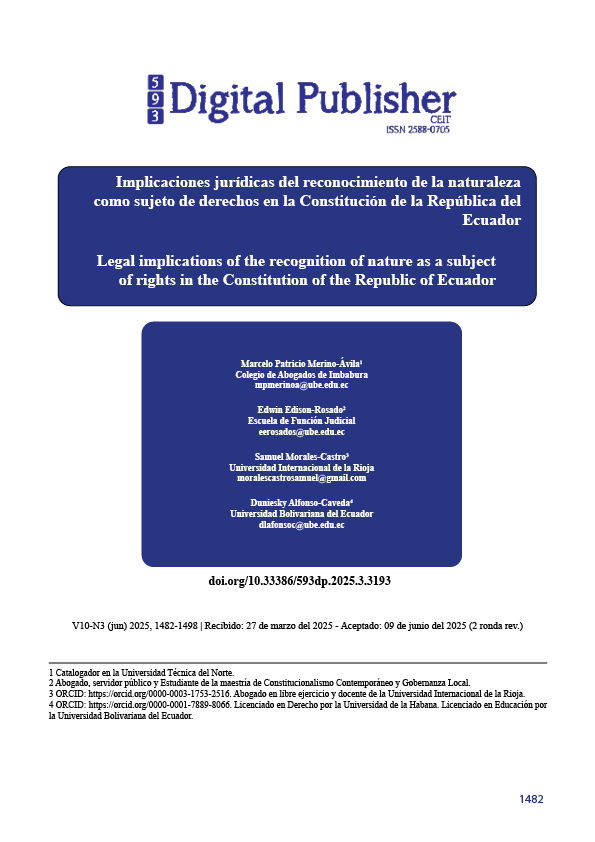Legal implications of the recognition of nature as a subject of rights in the Constitution of the Republic of Ecuador
Main Article Content
Abstract
The constitutional recognition of nature as a subject of rights in Ecuador represents a pioneering legal advance worldwide. This article analyzes the results of this legal innovation, highlighting the conceptual transformation of environmental law from an anthropocentric to an ecocentric paradigm. It also examines jurisprudential advances, the challenges of its implementation, and the importance of intercultural dialogue with indigenous legal systems. Finally, recommendations are proposed to strengthen the effective application of this constitutional framework. Based on this background, it has been determined that, despite nature being expressly recognized as a subject of rights, in practice much remains to be done and regulated. Given the magnitude of nature and its intangibility, it is difficult to determine and quantify damages, as well as to identify and hold accountable those who violate its rights. Therefore, it is considered pertinent, in addition to adapting the corresponding regulations, to socialize and raise awareness of the responsibility that all people have for the care of nature as the space in which life develops and is fundamental for human subsistence.
Downloads
Article Details

This work is licensed under a Creative Commons Attribution-NonCommercial-ShareAlike 4.0 International License.
1. Derechos de autor
Las obras que se publican en 593 Digital Publisher CEIT están sujetas a los siguientes términos:
1.1. 593 Digital Publisher CEIT, conserva los derechos patrimoniales (copyright) de las obras publicadas, favorece y permite la reutilización de las mismas bajo la licencia Licencia Creative Commons 4.0 de Reconocimiento-NoComercial-CompartirIgual 4.0, por lo cual se pueden copiar, usar, difundir, transmitir y exponer públicamente, siempre que:
1.1.a. Se cite la autoría y fuente original de su publicación (revista, editorial, URL).
1.1.b. No se usen para fines comerciales u onerosos.
1.1.c. Se mencione la existencia y especificaciones de esta licencia de uso.
References
Acosta, A. (2013). La naturaleza como sujeto de derechos. Abya-Yala.
Araya, L. (2019). Sistemas jurídicos indígenas y derecho ambiental: Un diálogo necesario. Revista de Estudios Jurídicos, 35(2), 45–60. https://doi.org/10.1234/rej.v35i2.2019
Asamblea Nacional del Ecuador. (2008). Constitución de la República del Ecuador (Registro Oficial No. 449, 20 de octubre de 2008). https://www.asambleanacional.gob.ec/es/constitucion-de-la-republica-del-ecuador
Asamblea Nacional del Ecuador. (2014). Código Orgánico Integral Penal (COIP) (Registro Oficial Suplemento No. 180, 10 de febrero de 2014). https://www.funcionjudicial.gob.ec/pdf/COIP.pdf
Asamblea Nacional del Ecuador. (2017). Código Orgánico del Ambiente (COA) (Registro Oficial Suplemento No. 983, 12 de abril de 2017). https://www.ambiente.gob.ec/codigo-organico-del-ambiente/
Cáceres, M. (2016). La sentencia del río Vilcabamba: Un avance en la protección constitucional de la naturaleza. Derecho y Ambiente, 12(1), 27–39.
Corte Constitucional del Ecuador. (2011). Sentencia No. 005-11-SIN-CC.
Corte Constitucional del Ecuador. (2021). Sentencia No. 1149-19-JP/21: Caso Bosque Protector Los Cedros (10 de diciembre de 2021). https://www.corteconstitucional.gob.ec/index.php/boletines-de-prensa/item/1470
Corte Constitucional del Ecuador. (2021). Sentencia No. 218-18-EP/21: Consulta previa y pueblos indígenas (24 de noviembre de 2021). https://www.corteconstitucional.gob.ec/index.php/boletines-de-prensa/item/1465
Corte Constitucional del Ecuador. (2021). Sentencia No. 253-20-JH/21: Caso Yasuní ITT – Derechos de la naturaleza y participación ciudadana (1 de diciembre de 2021). https://www.corteconstitucional.gob.ec/index.php/boletines-de-prensa/item/1467
Corte Constitucional del Ecuador. (2022). Sentencia No. 1145-18-JP/22: Protección del río Piatúa (9 de septiembre de 2022). https://www.corteconstitucional.gob.ec/index.php/boletines-de-prensa/item/1496
Corte Constitucional del Ecuador. (2022). Sentencia No. 37-19-IN/22: Inconstitucionalidad de decreto para actividad minera en áreas protegidas (31 de agosto de 2022). https://www.corteconstitucional.gob.ec/index.php/sentencias/item/1490
Corte Interamericana de Derechos Humanos. (2001). Caso de la Comunidad Mayagna (Sumo) Awas Tingni vs. Nicaragua (Sentencia de 31 de agosto de 2001). Serie C No. 79. https://www.corteidh.or.cr/docs/casos/articulos/seriec_79_esp.pdf
Corte Interamericana de Derechos Humanos. (2005). Caso de la Comunidad Indígena Yakye Axa vs. Paraguay (Sentencia de 17 de junio de 2005). Serie C No. 125. https://www.corteidh.or.cr/docs/casos/articulos/seriec_125_esp.pdf
Corte Interamericana de Derechos Humanos. (2010). Caso de la Comunidad Indígena Xákmok Kásek vs. Paraguay (Sentencia de 24 de agosto de 2010). Serie C No. 214. https://www.corteidh.or.cr/docs/casos/articulos/seriec_214_esp.pdf
Corte Interamericana de Derechos Humanos. (2012). Caso del Pueblo Indígena Kichwa de Sarayaku vs. Ecuador (Sentencia de 27 de junio de 2012). Serie C No. 245. https://www.corteidh.or.cr/docs/casos/articulos/seriec_245_esp.pdf
Corte Interamericana de Derechos Humanos. (2017). Opinión Consultiva OC-23/17: Medio ambiente y derechos humanos (Opinión consultiva de 15 de noviembre de 2017). Serie A No. 23. https://www.corteidh.or.cr/docs/opiniones/seriea_23_esp.pdf
García, R. (2020). Capacitación en derechos de la naturaleza para operadores jurídicos. Revista de Derecho Ambiental, 22(3), 113–129.
González, P. (2015). Derecho constitucional y naturaleza: Una nueva era. Anuario Jurídico Latinoamericano, 14(1), 85–98.
High Court of Uttarakhand. (2017). Mohd. Salim v. State of Uttarakhand & Others, Writ Petition (PIL) No. 126 of 2014 (Judgment of March 20, 2017). https://indiankanoon.org/doc/51246301/
Kauffman, C., et al. (2017). Ecocentrismo en la constitución ecuatoriana: Un análisis crítico. Journal of Environmental Law, 29(4), 655–678. https://doi.org/10.1093/jel/eqx015
López, J., Martínez, F., & Sánchez, T. (2021). Intereses económicos y derechos de la naturaleza: Tensiones y desafíos. Revista Latinoamericana de Derecho Ambiental, 16(2), 87–105.
Martínez, E., & López, S. (2018). Paradigmas emergentes en derecho ambiental: El caso ecuatoriano. Revista de Derecho Constitucional, 10(1), 55–74.
Mendoza, A. (2019). Limitaciones institucionales en la protección jurídica de la naturaleza. Revista Jurídica Ecuatoriana, 14(2), 140–159.
Minister for Treaty of Waitangi Negotiations & Whanganui Iwi. (2017). Te Awa Tupua (Whanganui River Claims Settlement) Act 2017. New Zealand Legislation. https://www.legislation.govt.nz/act/public/2017/0007/latest/whole.html
Pérez, M. (2018). La obligación estatal de restauración ecológica en Ecuador. Revista de Derecho y Medio Ambiente, 20(3), 45–60.
Quintana, D. (2017). El pluralismo jurídico y los derechos de la naturaleza en Ecuador. Cuadernos de Derecho Indígena, 8(1), 101–120.
Rodríguez, V. (2019). La legislación secundaria para la protección de la naturaleza. Revista Jurídica Latinoamericana, 12(4), 203–217.
Sánchez, L., & Vargas, R. (2017). Nuevas conceptualizaciones del daño ambiental en Ecuador. Derecho y Sociedad, 19(2), 78–94.
Smith, J., & Torres, M. (2022). Mecanismos legales para la representación de la naturaleza. International Environmental Law Review, 33(1), 23–44. https://doi.org/10.1093/ielr/33.1.23
Stone, C. (2010). Should trees have standing? Law, morality and the environment (3rd ed.). Oxford University Press.
UNEP. (2019). Restoration and conservation of ecosystems: Legal frameworks and challenges. United Nations Environment Programme.
Vargas, M. (2018). Derechos indígenas y protección ambiental en Ecuador. Revista de Estudios Culturales, 14(2), 71–90.
Yánez, P. (2021). Saberes ancestrales y derecho ambiental: Hacia un enfoque intercultural. Revista Latinoamericana de Derechos Humanos, 15(1), 55–74.





